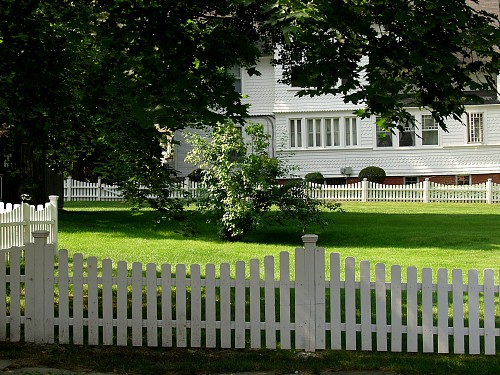Fence Materials Pros and Cons
Fences are an important finishing touch for every home. Depending on your particular needs, the right fence will provide privacy, security, and/or curb appeal. Learn more about the exciting options for fence materials on the market today (below) and find the best for your property. Then decide whether to install it yourself or hire an expert fencing contractor.
Wood Fence
Pros: Wood fence is good-looking, natural, sturdy, and affordable. Wood is readily available; for a truly eco-friendly wood fence, choose a species that is locally grown and sustainable. Easy to work with and to finish according to your individual color preference, wood is oenof the fence materials most widely accepted by HOAs.
Cons: A wood fence is high maintenance (needs regular painting or varnishing) and is vulnerable to warping, rot, fire, and insect infestation. Without actively maintaining a wooden fence, you’ll need to hire a local fence company nearby to provide a specialist to make bigger repairs.
Composite Fence
Pros: Composite fence looks a lot like wood, without the hassle of painting or staining. Many brands are made from as much as 95 percent recycled content (wood fiber and plastic), via a waste-free manufacturing process. Both strong and durable, composite fence is also rot-, weather-, wind-, and insect-resistant.
Cons: You’ll find that composite fence is costly (twice the cost of pressure-treated lumber). Fences made of composite tend to fade, scratch, and stain easily. Because it is non-porous, composite fence is hard to touch up with paint.
Vinyl Fence
Pros: A vinyl fence offers the advantages of being easy-care (just hose it clean), weather resistant, insect-proof, and durable. Vinyl fences come in a wide range of styles. This fencing is approved by many home owners associations.
Cons: Vinyl fence is not as natural looking or as affordable as a wood fence. Color selection is limited. Vinyl is not considered eco-friendly and is difficult to recycle. Poorer quality vinyl fence can be damaged by UV rays and excessive heat or cold.
Aluminum Fence
Pros: Aluminum fence is easy to work with, because it’s lightweight, malleable and easily molded, and capable of being welded. It is available in 4 strength grades, requires minimal maintenance, won’t corrode or crack, and resists fading. Long-lasting aluminum fence is 100 percent recyclable.
Cons: Higher quality aluminum fence is expensive, while lower grades are not very strong. Aluminum’s low impact resistance makes it susceptible to bending or denting.
Steel Fence
Pros: The strongest of all fence materials, steel fence is durable and resists collapse. It can be welded and is recyclable.
Cons: Steel fence may corrode, particularly when exposed to salt (near an ocean, for example). Its heavy weight makes transportation difficult and expensive. A steel fence is high maintenance, requiring regular sanding and painting.
Chain Link Fence
Pros: Chain link fence is inexpensive, secure, and easy to install. It works as a good support for climbing plants. New types of chain link fence are polymer-coated in various colors. At the end of its useful life, a chain link fence may be recycled as scrap metal.
Cons: Chain link is considered utilitarian and unattractive. Its open mesh doesn’t provide privacy.
Wrought Iron Fence
Pros: A wrought iron fence can be worked into distinctive designs, making it attractive and perfect for decorative features such as flowerbed fencing. Besides offering great curb appeal, wrought iron fence is very strong and durable. It’s easy to reuse and recycle, too.
Cons: Wrought iron fence is expensive. What’s more, it must be sanded and repainted every 2-4 years to control rust.
Bamboo Fencing
Pros: The light weight of bamboo fencing makes this naturally attractive fence material easy to install and to move. Unlike wood, insect infestation is not a problem. Bamboo from sustainable sources is environmentally friendly.
Cons: Bamboo fencing is relatively costly. This fence material rots easily, so the fence must be made with a base layer to protect it against contact with the soil. It should also be sealed and waterproofed annually.
Tips for Installing a Fence
- Find out where your property line is before installing your fence. Are there any easements to consider?
- Clarify local regulations before getting started. Will you need a permit or HOA approval for your fence?
- Contact a one-call number to make sure you won't hit any underground utilities.
- Decide on a budget. This will help you narrow down the types of fence materials to best suit your needs.
- Consult with a landscape design expert if your new fence going to be part of a larger landscaping project.
Laura Firszt writes for networx.com.
Updated December 16, 2018.
Looking for a Pro? Call us (866) 441-6648

Average Costs
Related Experiences

Emergency Fencing Repair After A Tree Fell On My Chain Link Fence

Local Handyman Fixes Fence Damaged By Jacksonville Summer Storm




